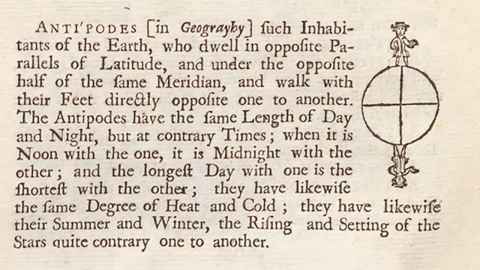Special Collections Twenty at 20: our wordiest title page
29 April 2022
To mark this year’s twentieth anniversary of Special Collections, the curators have selected some intriguing items for the Twenty at 20 series. Here is number three.

Wordiest title page in Special Collections
Many older books in Special Collections have very wordy title pages, reflecting a European publishing practice that for a time favoured lengthy descriptive text over blank space.1 This prompted a search of our stacks for the book with the wordiest title page. Fittingly, it was one about words.

Nathan Bailey’s Dictionarium Britannicum: or a more compleat universal etymological English dictionary than any extant… was first published in 1730. Its 350-word title page, printed in red and black ink, includes publishing information and text that effectively serves as a combined title, contents list and promotional blurb.
This includes spelling out the dictionary’s arrangement and intended audience: “The Whole digested into an Alphabetical Order, not only for the Information of the Ignorant, but the Entertainment of the Curious; and also the Benefit of Artificers, Tradesmen, Young Students and Foreigners.”2
Dictionarium Britannicum contains around 48,000 terms and, according to the title page, nearly 500 woodcut illustrations to give “… a clearer idea of those figures, not so well apprehended by verbal description.” It has been described as a milestone in 18th century English lexicography that “made signal advances in scope, etymology, and other lexicographical technique.”3 It evolved from Bailey’s two-part work from the 1720s, An Universal Etymological English Dictionary.
Bailey’s popular and influential dictionaries were reprinted and revised many times, including for several decades after his death in 1742.3

Dictionary collection
Bailey’s works are among several monolingual English dictionaries in our stacks dating from 1658 onwards that help to chart the development of English lexicography and language.
The others include later editions of Samuel Johnson’s renowned A dictionary of the English language…, first published in 1755. Among the works Johnson referred to during the compilation of his dictionary was a copy of the 1736 edition of Bailey’s Dictionarium Britannicum, which had been specially interleaved with blank pages for making annotations.4
Several of our dictionary holdings, including this copy of the 1730 Dictionarium Britannicum, once belonged to Julius Hogben (1887-1973), an Auckland barrister and arts administrator who was described as a “man of erudite wit [who] loved Latin and collected old English dictionaries.”5
Jo Birks, Cultural Collections Adviser
References
1. Smith, M. (2010). Title-page. In M.F. Suarez, S.J. and H.R. Woudhuysen (Eds.), The Oxford Companion to the Book.
2. Bailey, N., Miller, P., & Gordon, G. (1730). Dictionarium britannicum; or, A more compleat universal etymological English dictionary than any extant. London: Printed for T. Cox. Glass Case Outsize 423 B15d
3. Starnes, D., Noyes, G.E., & Stein, G. (1991). The English dictionary from Cawdrey to Johnson, 1604-1755 (New ed.)… Amsterdam ; Philadelphia: J. Benjamin Pub., p.117; pp.117-125. Main Collection 423 S79 1991
4. McDermott, A. (2012). The compilation methods of Johnson’s Dictionary, in A. McDermott (Ed.), Ashgate critical essays on early English lexicographers, Volume 5: The eighteenth century, Farnham: Ashgate, pp.105-124.
5. Festival founder dies aged 86. (1973, September 7). New Zealand Herald, p.3. Retrieved from Papers Past.
Te Tumu Herenga | Libraries and Learning Services
Email: digital.comms@auckland.ac.nz